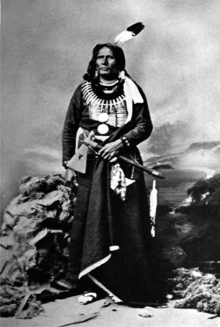
Back Standing Bear Catalan Standing Bear (Ponca) German Standing Bear French Steande Bear Frisian Standing Bear (Ponca) NDS Dinelen Ayı Turkish
Standing Bear (c. 1829–1908) (Ponca official orthography: Maⁿchú-Naⁿzhíⁿ/Macunajin;[1] other spellings: Ma-chú-nu-zhe, Ma-chú-na-zhe or Mantcunanjin pronounced [mãtʃuꜜnãʒĩꜜ]) was a Ponca chief and Native American civil rights leader who successfully argued in U.S. District Court in 1879 in Omaha that Native Americans are "persons within the meaning of the law" and have the right of habeas corpus,[2] thus becoming the first Native American judicially granted civil rights under American law. His first wife Zazette Primeau (Primo), daughter of Lone Chief (also known as Antoine Primeau), mother of Prairie Flower and Bear Shield, was also a signatory on the 1879 writ that initiated the famous court case.[3]
- ^ U.S. Indian Census Rolls, 1885 Ponca Indians of Dakota
- ^ Tennant, Brad (2011). "'Excluding Indians Not Taxed': Dred Scott, Standing Bear, Elk and the Legal Status of Native Americans in the Latter Half of the Nineteenth Century". International Social Science Review. 86 (1–2): 24–43. JSTOR 41887472.
- ^ Zyliff (1880). "AN INDIAN'S ATTEMPT TO APPEAL FROM THE TOMAHAWK TO THE COURTS, WITH SOME SUGGESTIONS TOWARDS A SOLUTION OF THE INDIAN QUESTION". Boston : Lockwood, Brooks.
